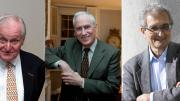President Barack Obama on Friday announced winners of the 2011 National Humanities Medals. Among the Harvard-affiliated honorands are:
Poet John Ashbery ’49, Litt.D. ’01. His honorary-degree description and citation, published in the July-August 2001 Harvard Magazine, read:
The author of more than 20 poetry collections, translated into more than 20 languages, he is considered by many the foremost American poet of his generation. Unflaggingly avant-garde, he aims in his writing for meanings that transcend mere verbal expression. In saluting Ashbery at a dinner for the honorands, President Neil L. Rudenstine said that he had read Ashbery as a graduate student at Harvard and had recently rediscovered in his copy of one of the poet’s books these marginalia: "Extraordinary …Moving…Also baffling ….What is this poem about?" Doctor of letters: Through his verse we see us as we truly behave; in an allusive American idiom all his own, he captures the syncopation and polyphony of contemporary experience.
Pforzheimer University Professor Robert Darnton ’60, G ’68, University Librarian and a foremost scholar of the history of the book—and a leading advocate of creating a public, national digital library. See the recent Harvard Magazine feature, "Gutenberg 2.o," for Darnton's views of the future of Harvard's libraries.
Andrew Delbanco '73, Ph.D. '80, Levin professor in the humanities and chair of American studies at Columbia, where he is a leading literary scholar, best known for his work on Emerson and his recent biography of Melville. His New York Review of Books essays on higher education form the basis for his forthcoming book, College: What It Was, Is, and Should Be (Princeton).
Lamont University Professor Amartya Sen, LL.D. '00, the economist, philosopher, and winner of the 1998 Nobel Prize in economics. The description of and citation for his honorary degree, conferred during an interval when he was at Cambridge University, rather than at Harvard, read:
A 1998 Nobel laureate in economics, Sen is renowned for work on social choice, inequality, and famine. Doctor of laws: With paramount concern for the world’s impoverished, he infuses economics with a passion for fairness, his vision of freedom and humane development pointing the way toward a better life for all.
Read about his recent research on poverty and inequality. Read his 2000 Commencement afternoon address here. Sen's most recent book, The Idea of Justice, was published by Harvard University Press.
Former faculty member Kwame Anthony Appiah, a moral philosopher, now at Princeton, was also honored.
According to the National Endowment for the humanities news release, the medals ceremony will be live streamed at 1:45 p.m. on Monday, February 13 at www.WhiteHouse.gov/Live.









